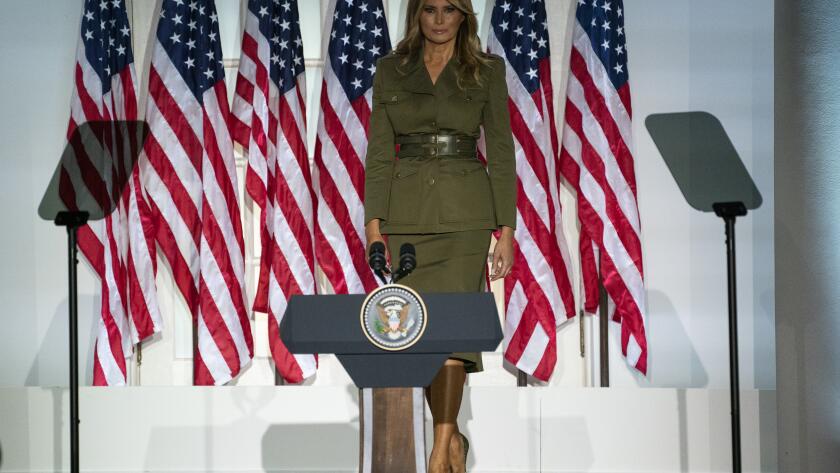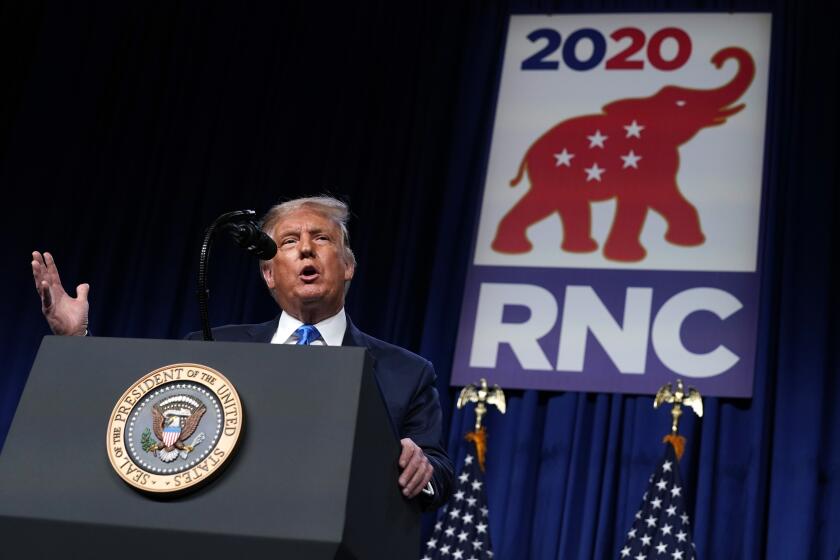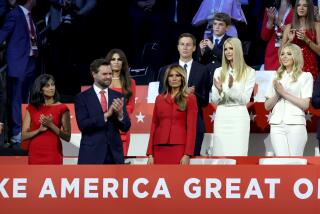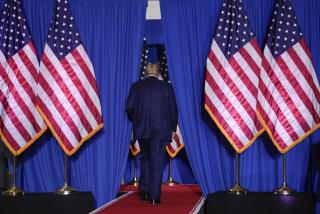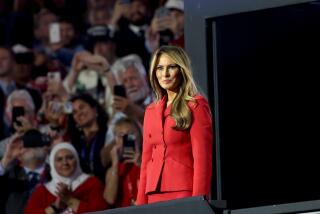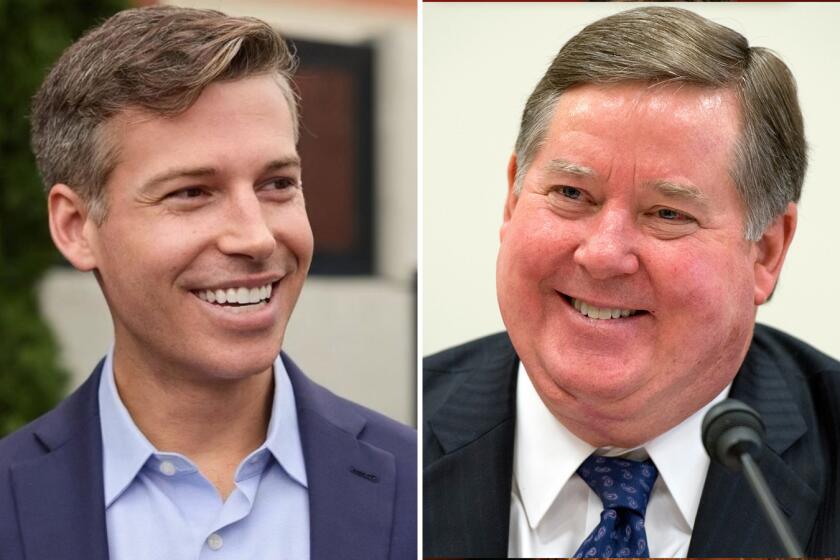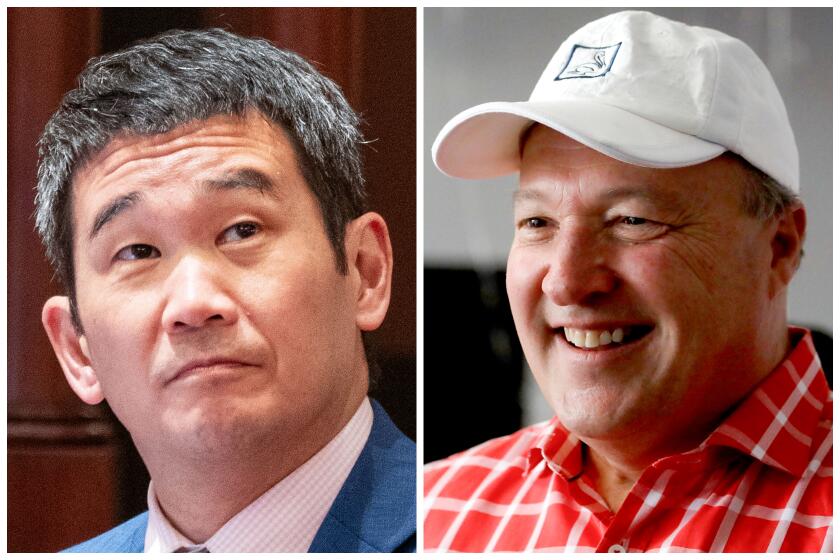Melania Trump offers sympathy to COVID victims, tries to soften husband’s image
The first lady breaks presidential protocol by delivering convention address from the White House Rose Garden.
First Lady Melania Trump sought to recast her husband’s image Tuesday in a Republican National Convention speech that was often at odds with the hard-edged reality of Donald Trump’s presidency.
Seeking to advance his uphill battle for a second term, the first lady acknowledged the death, sickness and personal hardships of millions of Americans during the COVID-19 pandemic, expressing the kind of empathy rarely shown by the president.
“My deepest sympathy goes out to everyone who has lost a loved one, and my prayers are with those who are ill or suffering,” she said in a speech to an audience on folding chairs in the Rose Garden at the White House. “I know many people are anxious, and some feel helpless. I want you to know you’re not alone.”
With more than 178,000 Americans dead so far and hundreds more losing their lives daily, the United States has stood out as the least effective of the wealthy developed countries in getting the coronavirus spread under control. The president has defied the advice of scientific experts and promoted unproven treatments for COVID-19, but his wife assured Americans he was well-suited to lead the nation out of the crisis.
“Donald will not rest until he has done all he can to take care of everyone impacted by this terrible pandemic,” she said.
The first lady also struck a decidedly softer tone than her husband on the nation’s reckoning with systemic racism.
“I urge people to come together in a civil manner so we can work and live up to our standard American ideals,” she said as police were firing tear gas and rubber bullets at protesters during the third night of upheaval in Kenosha, Wis., where police shot 29-year-old Jacob Blake in the back multiple times on Sunday in an incident captured on video. Blake was paralyzed from the waist down and remains hospitalized.
“I also ask people to stop the violence and looting being done in the name of justice, and never make assumptions based on the color of a person’s skin,” Melania Trump said.
She recalled her 2018 trip to Africa, where she visited a 17th century slave-trade fort in Ghana.
“I was horrified when I listened to the guide tell me so many inhumane stories,” she said. “And I gained a new perspective. This time in our history, we must never forget so that we can ensure that it never happens again.”
The first lady was one of many speakers at the four-day convention to try to improve public perceptions of a president whose Twitter posts trashing his adversaries and stoking racism have helped keep his approval ratings low.
Republicans hoped she could enhance her husband’s appeal to women, who preferred Hillary Clinton over Trump, 54% to 42%, in the 2016 election, according to exit polls. Women now favor his Democratic challenger, Joe Biden, over Trump by 56% to 40%, according to a voter survey this month by ABC News and the Washington Post.
The speech gave Melania Trump a chance to recover from the political fiasco of her 2016 speech at the Republican convention in Cleveland. After more than two days of denials that passages had been plagiarized from a speech by former First Lady Michelle Obama, the Trump campaign admitted a speechwriter had cribbed the material.
The first lady also invited controversy by delivering her 2020 speech at the White House, just as the president plans to do on Thursday with his speech formally accepting the party nomination. Critics charged it was one of many instances of the president breaking norms, if not laws, by harnessing government resources to advance his personal or political interests.
The Republican National Convention, with its planned use of the White House as backdrop and speeches from administration officials, spurs outcry from ethics experts.
The Rose Garden speech, the highest-profile event yet for a first lady who keeps a low profile, came at a sensitive time. A recent book by Washington Post reporter Mary Jordan revealed that Melania Trump was renegotiating her prenuptial agreement in 2016 when the president was fighting allegations of extramarital sex and facing criticism for saying on tape that he grabbed women by the crotch without their consent.
Another book about the first lady, by former friend Stephanie Winston Wolkoff, is publishing Sept. 1. Winston Wolkoff was a leading organizer of the president’s 2017 inauguration celebrations, which have drawn scrutiny from federal prosecutors investigating the events’ finances.
Trump’s emphasis in her speech on the welfare of children and her immigrant background — she was born and raised in Slovenia, at the time part of Yugoslavia — clashed with her husband’s record.
Limits on legal and illegal immigration have been a hallmark of the Trump presidency. And one of the most potent lines of attack that Democrats have used against President Trump has been outrage over his administration’s separation of immigrant children from their parents when they cross the border from Mexico into the United States.
Touting her “Be Best” program to help kids meet their potential, Melania Trump said she understood how concerned the nation’s mothers are about “how mean and manipulative social media can be,” a reference to her campaign against online bullying.
“For our next generation, helping children is not a political goal,” she said. “It is our moral imperative.”
Trump also vouched for her husband’s integrity. “We all know Donald Trump makes no secret about how he feels about things. Total honesty is what we as citizens deserve from our president. Whether you like it or not, you always know what he’s thinking.”
Since taking office, the president has made more than 20,000 false or misleading claims, an average of a dozen a day, according to the Washington Post Fact Checker database.
The first lady also praised her husband for calling upon “countries across the world to end religious persecution and honor the right of every person to worship as they choose.” During his 2016 campaign, Trump called for barring all Muslims from entering the United States, and as president he adopted a travel ban that affected residents of several Muslim-majority nations.
More to Read
Get the L.A. Times Politics newsletter
Deeply reported insights into legislation, politics and policy from Sacramento, Washington and beyond. In your inbox three times per week.
You may occasionally receive promotional content from the Los Angeles Times.
